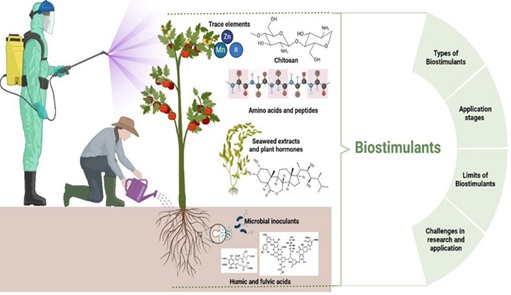| (Mains Exam, General Studies Paper-2: Topics related to direct and indirect agricultural assistance and minimum support price; Public distribution system- objectives, functions, limitations, reforms; Buffer stock and food security related topics; Technology mission; Economics related to animal husbandry) |
Reference
Union Agriculture Minister Shivraj Singh Chauhan has written a letter to the Chief Ministers of all the states requesting them to immediately stop the 'forced tagging' of nano-fertilizers or biostimulants with conventional fertilizers.

Related Issues
- Retailers are not selling subsidized fertilizers like urea and diammonium phosphate (DAP) to farmers unless they buy biostimulants.
- Apart from this, many farmers had also complained about the ineffectiveness of biostimulants.
What are biostimulants
- Biostimulants help in increasing crop yield by stimulating vegetative processes in plants.
- Plant wastes and seaweed extracts are sometimes used in their production.
- The Fertilizer (Inorganic, Organic or Mixed) (Control) Order, 1985 regulates the manufacture and sale of biostimulants.
- The order defines biostimulants as a substance or microorganism or a combination of both.
Functions of Biostimulants
- Stimulate physiological processes in plants
- Enhance plant nutrient absorption, growth, yield, nutrition efficiency, crop quality and stress tolerance
India's Biostimulant Market
- According to market research firm Fortune Business Insights, India's biostimulant market was estimated to be US$355.53 million in 2024.
- It is estimated that this market will grow from US$ 410.78 million in 2025 to US$ 1,135.96 million by 2032.
- This represents a compound annual growth rate (CAGR) of 15.64% during the forecast period.
Regulation of Biostimulants by the Government
- Biostimulants did not fall into the existing fertilizer or pesticide categories, so they were sold in the open market without government approval for a long time.
- Fertilizers and pesticides in India are governed by the Fertilizer Control Order of 1985 and the Insecticides Act of 1968 respectively.
- The Union Ministry of Agriculture and Farmers Welfare issues the Fertilizer Control Order (FCO) under the Essential Commodities Act, 1955 and amends it from time to time.
- In 2017, NITI Aayog and the Ministry of Agriculture prepared a framework for biostimulants.
- Finally, in February 2021, the Ministry amended the FCO of 1985 to include biostimulants in it, thereby regulating their manufacture, sale and import.
Fertilizer Control Order in respect of Biostimulants
- The inclusion of biostimulants in the FCO empowered the Central Government to prescribe specifications in respect of the same.
- The FCO has classified the specified biostimulants in its Schedule VI into eight categories which include botanical extracts (and seaweed extracts), bio-chemicals, vitamins and antioxidants.
- Every manufacturer or importer of biostimulants must submit an application to the Fertilizer Controller along with the required product information.
- The chemical composition of the product, source (natural extracts of plant/microorganism/animal/synthetic), shelf-life, reports of bio-efficacy tests and toxicity and other data should be submitted.
Toxicity Tests
- The five basic acute toxicity tests are:
- Acute oral (rat)
- Acute dermal (rat)
- Acute respiratory (rat)
- Primary skin irritation (rabbit)
- Eye irritation (rabbit)
- The four ecotoxicity tests are:
- Toxicity to birds
- Toxicity to fish (freshwater)
- Toxicity to bees
- Toxicity to earthworms
Testing and Testing
- As per FCO, no biostimulants should contain any pesticides in excess of the permissible limit of 0.01 ppm.
- In addition, agricultural bioefficacy tests will be conducted under National Agricultural Research System including Indian Council of Agricultural Research and State Agricultural Universities.
Constitution of Central Biostimulants Committee
- On April 9, 2021, the Ministry of Agriculture constituted the Central Biostimulants Committee for a term of five years with the Agriculture Commissioner as Chairperson and seven other members.
- Under the FCO, it will advise the Centre on the following subjects:
- Introduction of any new biostimulants
- Specifications of various biostimulants
- Methods of sampling and their analysis
- Minimum laboratory requirements
- Method of testing biostimulants
- Any other matter assigned to it by the Central Government
Latest Government Actions on Biostimulants
- As per the revised FCO order in 2021, manufacturers can manufacture and sell biostimulants for two years provided they apply for provisional registration.
- The agriculture ministry has repeatedly extended the deadline by two years, allowing most manufacturers to manufacture and sell biostimulants on a provisional registration basis by 2021.
- While regular registration requires companies to submit testing protocols to the government.
- On May 26, the agriculture ministry had extended the deadline for several crops, including tomato, chilli, cucumber, paddy, brinjal, cotton, potato, green gram, grapes, hot pepper, soybean, maize and onion.